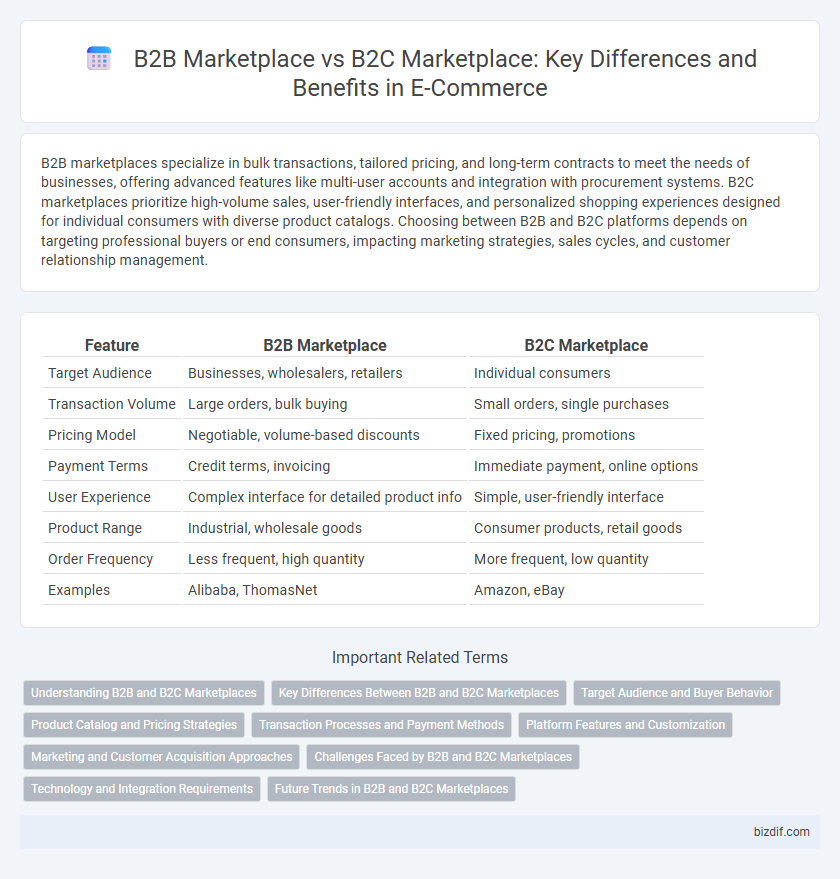B2B marketplaces specialize in bulk transactions, tailored pricing, and long-term contracts to meet the needs of businesses, offering advanced features like multi-user accounts and integration with procurement systems. B2C marketplaces prioritize high-volume sales, user-friendly interfaces, and personalized shopping experiences designed for individual consumers with diverse product catalogs. Choosing between B2B and B2C platforms depends on targeting professional buyers or end consumers, impacting marketing strategies, sales cycles, and customer relationship management.
Table of Comparison
| Feature | B2B Marketplace | B2C Marketplace |
|---|---|---|
| Target Audience | Businesses, wholesalers, retailers | Individual consumers |
| Transaction Volume | Large orders, bulk buying | Small orders, single purchases |
| Pricing Model | Negotiable, volume-based discounts | Fixed pricing, promotions |
| Payment Terms | Credit terms, invoicing | Immediate payment, online options |
| User Experience | Complex interface for detailed product info | Simple, user-friendly interface |
| Product Range | Industrial, wholesale goods | Consumer products, retail goods |
| Order Frequency | Less frequent, high quantity | More frequent, low quantity |
| Examples | Alibaba, ThomasNet | Amazon, eBay |
Understanding B2B and B2C Marketplaces
B2B marketplaces connect businesses, facilitating bulk transactions and long-term partnerships, emphasizing negotiated pricing and customized services. B2C marketplaces target individual consumers, prioritizing convenience, fast purchasing decisions, and standardized pricing models. Understanding these distinctions enables companies to tailor their strategies effectively for increased sales and customer satisfaction.
Key Differences Between B2B and B2C Marketplaces
B2B marketplaces primarily facilitate bulk transactions between businesses, emphasizing long-term contracts and negotiated pricing, while B2C marketplaces target individual consumers with fixed prices and smaller order volumes. B2B platforms often integrate advanced features like purchase order management, multiple user roles, and complex payment terms, contrasting with B2C sites that focus on user-friendly interfaces and instant payment options. The decision-making process in B2B involves multiple stakeholders and longer sales cycles, whereas B2C purchases are typically impulsive and quicker.
Target Audience and Buyer Behavior
B2B marketplaces primarily target businesses seeking bulk purchases, long-term contracts, and negotiated pricing, reflecting a buyer behavior centered on relationship-building and detailed product specifications. B2C marketplaces cater to individual consumers driven by convenience, price sensitivity, and instant gratification, with rapid decision-making and impulse buying patterns. Understanding these distinctions in target audience and buyer behavior is crucial for tailoring marketing strategies and platform features in e-commerce.
Product Catalog and Pricing Strategies
B2B marketplaces feature extensive product catalogs with bulk quantities, specialized goods, and customizable options tailored to business needs, while B2C marketplaces offer diverse, consumer-focused product selections with standardized items. Pricing strategies in B2B involve negotiated contracts, volume discounts, and tiered pricing models to accommodate large orders and long-term partnerships. B2C pricing typically relies on fixed prices, dynamic promotions, and competitive discounts aimed at driving quick consumer purchases.
Transaction Processes and Payment Methods
B2B marketplaces prioritize complex transaction processes involving bulk orders, negotiated pricing, and longer payment terms, often integrating invoicing and purchase order systems to streamline workflows. Payment methods in B2B platforms typically include bank transfers, credit terms, and digital payment solutions tailored for corporate finance, emphasizing security and compliance. In contrast, B2C marketplaces focus on simple, immediate transactions with fixed prices and support consumer-friendly payment options like credit cards, digital wallets, and buy-now-pay-later services to enhance convenience and speed.
Platform Features and Customization
B2B marketplaces prioritize advanced platform features such as bulk ordering, multi-user accounts, and custom pricing tiers to accommodate complex business transactions, whereas B2C marketplaces focus on streamlined user interfaces, personalized recommendations, and seamless checkout experiences for individual consumers. Customization options in B2B platforms include tailored workflows, integrations with ERP systems, and detailed analytics dashboards, enabling businesses to optimize procurement and sales processes. In contrast, B2C marketplaces emphasize marketing tools, customer reviews, and loyalty programs designed to enhance customer engagement and drive repeat purchases.
Marketing and Customer Acquisition Approaches
B2B marketplaces prioritize targeted relationship-building strategies such as personalized outreach, industry-specific content marketing, and account-based marketing to acquire high-value clients and foster long-term partnerships. In contrast, B2C marketplaces leverage mass marketing tactics like social media advertising, influencer collaborations, and search engine optimization to attract a broad consumer base rapidly. Both models utilize data analytics to optimize customer acquisition funnels, but B2B emphasizes lead nurturing while B2C focuses on conversion rate optimization.
Challenges Faced by B2B and B2C Marketplaces
B2B marketplaces face complex challenges such as prolonged sales cycles, customized pricing negotiations, and integration with enterprise systems, which demand robust CRM and ERP solutions. B2C marketplaces struggle with high customer acquisition costs, intense competition, and the need for seamless user experience to maintain consumer loyalty and drive repeat purchases. Both marketplaces require advanced data analytics and security measures to address unique operational and transactional obstacles effectively.
Technology and Integration Requirements
B2B marketplaces demand advanced technology solutions and seamless integration with ERP, CRM, and supply chain management systems to support complex purchasing workflows and large-volume orders. B2C marketplaces prioritize user-friendly interfaces and scalable e-commerce platforms that handle high traffic and enable smooth payment gateway integration. Both require robust API capabilities to ensure real-time data synchronization and efficient inventory management across multiple sales channels.
Future Trends in B2B and B2C Marketplaces
B2B marketplaces are increasingly leveraging AI-driven analytics and personalized pricing models to enhance procurement efficiency and supplier relationships, driving future growth. B2C marketplaces prioritize immersive shopping experiences using augmented reality (AR) and social commerce integration to boost customer engagement and sales. Both B2B and B2C platforms are adopting blockchain for transparent transactions and secure data management, signaling a shift toward decentralized e-commerce ecosystems.
B2B Marketplace vs B2C Marketplace Infographic

 bizdif.com
bizdif.com